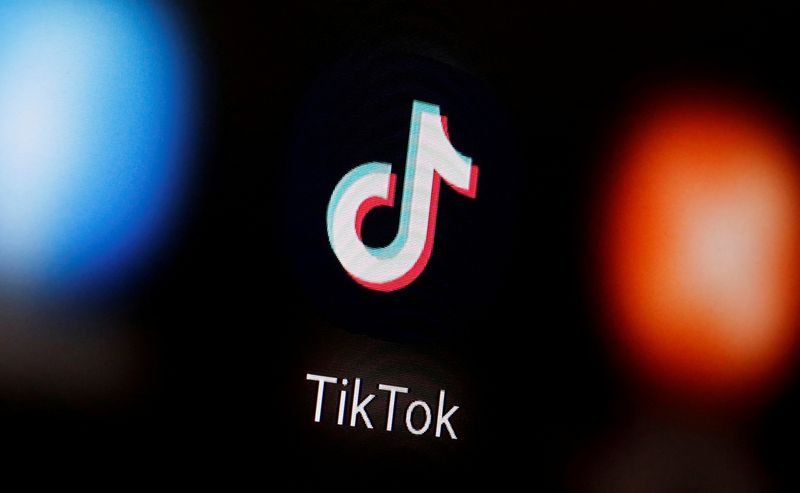By Echo Wang and Jonathan Stempel
(Reuters) - TikTok and one of its employees on Monday separately sued U.S. President Donald Trump's administration over his executive order banning transactions in the United States with the popular short-form video-sharing app, calling it a pretext to fuel anti-China rhetoric as he seeks re-election.
Culver City, California-based TikTok and its Chinese parent ByteDance Ltd rejected what they called the White House's position that it was a national security threat, saying they had taken "extraordinary measures to protect the privacy and security of TikTok's U.S. user data."
They also described Trump's call in his Aug. 6 executive order for a TikTok ban as a means to further his alleged "broader campaign of anti-China rhetoric" ahead of the Nov. 3 U.S. presidential election, where Trump is seeking a second term.
"We do not take suing the government lightly," TikTok said in a blog post. "But with the Executive Order threatening to bring a ban on our U.S. operations ... we simply have no choice."
Patrick Ryan, a technical program manager at TikTok, sued the Trump administration over concerns that he and his 1,500 colleagues, including many on employment visas, will lose their jobs next month if Trump’s order is enforced.
"These are not decisions that belong to the government," Ryan said in an interview. "It's not okay to even consider."
Alex Urbelis, a lawyer representing Ryan in the lawsuit in San Francisco federal court, said the order suffered from "unconstitutional vagueness" and deprived TikTok employees of due process.
The White House referred a request for comment to the U.S. Department of Justice, which declined to comment on the company's lawsuit and did not immediately respond to a request for comment on Ryan's case.
TikTok and ByteDance are seeking a permanent injunction to block Trump from enforcing his Aug. 6 order. They allege the Trump administration violated their constitutional right to due process by banning the company without opportunity to respond to accusations.
They also allege Trump lacked proper legal authority to issue the order, saying he misused the International Emergency Economic Powers Act, which lets the president regulate international commerce during a national emergency.
Trump had in May 2019 invoked that law to stop alleged efforts by foreign telecommunications companies to conduct economic and industrial espionage against the United States.
The lawsuit filed in Los Angeles federal court names Trump, the U.S. Department of Commerce and Commerce Secretary Wilbur Ross as defendants.
Amid growing distrust between Washington and Beijing, Trump had for weeks complained that TikTok was a national security threat that might share information about users with the Chinese government.
His Aug. 6 executive order called for banning transactions with the app after 45 days.
Trump issued a separate executive order on Aug. 14 giving ByteDance 90 days to divest TikTok's U.S. operations and any data TikTok had gathered in the United States.
Reuters reported last week that TikTok had been preparing a legal challenge.
ByteDance had acquired Shanghai-based video app Musical.ly in a $1 billion transaction in 2017, and relaunched it as TikTok the following year.
TikTok, best known for short videos of people dancing that are popular among teenagers, had 92 million monthly users in U.S. as of June and 689 monthly users globally as of July, according to the lawsuit.
The Trump administration has said Americans should be cautious in using TikTok. Under a law introduced in 2017 under President Xi Jinping, Chinese companies have an obligation to support and cooperate in China's national intelligence work.
But TikTok said Trump's Aug. 6 was not rooted in genuine national security concerns or supported by the emergency he had declared a year earlier.
It called the order "a gross misappropriation of IEEPA authority and a pretext for furthering the President's broader campaign of anti-China rhetoric in the run-up to the U.S. election."
ByteDance has been in talks to sell TikTok's North American, Australian and New Zealand operations to companies including Microsoft Corp (NASDAQ:MSFT) and Oracle Corp (NYSE:ORCL).
Those assets could be worth $25 billion to $30 billion, people familiar with the matter have said.
Before buying TikTok, ByteDance had not sought advance approval from the Committee on Foreign Investment in the United States, which reviews acquisitions for potential national security risks.

CFIUS later opened an investigation and on July 30 issued a letter stating it found national security risks associated with the purchase. But it "repeatedly refused" to engage with ByteDance's proposals to address concerns, including a nonbinding letter of intent to sell to Microsoft presented earlier July 30, according to the lawsuit.